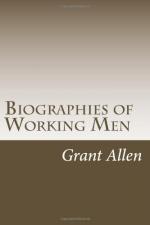William Herschel, the great astronomer (born in 1738), was the fourth child of his mother, and with his brothers he was brought up at the garrison school in Hanover, together with the sons of the other common soldiers. There he learned, not only the three R’s, but also a little French and English. Still, the boy was not content with these ordinary studies; in his own playtime he took lessons in Latin and mathematics privately with the regimental schoolmaster. The young Herschels, indeed, were exceptionally fortunate in the possession of an excellent and intelligent father, who was able to direct their minds into channels which few people of their position in life have the opportunity of entering. Isaac Herschel was partly of Jewish descent, and he inherited in a marked degree two very striking Jewish gifts—a turn for music, and a turn for philosophy. The Jews are probably the oldest civilized race now remaining on earth; and their musical faculties have been continuously exercised from a time long before the days of David, so that now they produce undoubtedly a far larger proportion of musicians and composers than any other class of the population whatsoever. They are also deeply interested in the same profound theological and philosophical problems which were discussed with so much acuteness and freedom in the Book of Ecclesiastes and the subtle argument of Job and his friends. There has never been a time when the Jewish mind has not exercised itself profoundly on these deep and difficult questions; and the Hanover bandsman inherited from his Jewish ancestry an unusual interest in similar philosophical subjects. Thus, while the little ones were sleeping in the same common room at night, William and his father were often heard discussing the ideas of such abstruse thinkers as Newton and Leibnitz, whose names must have sounded strange indeed to the ordinary frequenters of the Hanover barracks. On such occasions good dame Herschel was often compelled to interpose between them, lest the loudness of their logic should wake the younger children in the crib hard by.
William, however, possessed yet another gift, which he is less likely to have derived from the Jewish side of the house. He and his brother Alexander were both distinguished by a natural taste for mechanics, and early gave proof of their learning by turning neat globes with the equator and ecliptic accurately engraved upon them, or by making model instruments for their own amusement out of bits of pasteboard. Thus, in early opportunities and educational advantages, the young Herschels certainly started in life far better equipped than most working men’s sons; and, considering their father’s doubtful position, it may seem at first sight rather a stretch of language to describe him as a working man at all. Nevertheless, when one remembers the humble grade of military bandsmen in Germany, even at the present day, and the fact that most of the Herschel family remained in that grade during all their lives, it is clear that William Herschel’s life may be fairly included within the scope of the present series. “In my fifteenth year,” he says himself, “I enlisted in military service,” and he evidently looked upon his enlistment in exactly the same light as that of any ordinary soldier.




